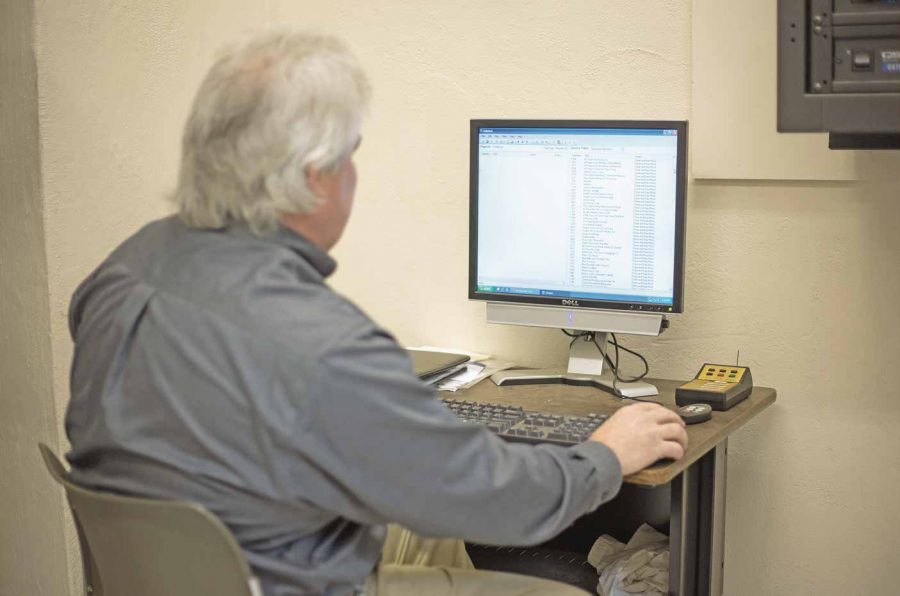For most, the small white-tiled room behind the metal door is a mystery. But for Nawar Yossef, unlocking the door to Denny Chimes is part of his job.
Yossef, a second-year graduate student receiving his master’s degree in organ performance, plays in Denny Chimes as part of his assistantship. For the third semester, Yossef will be playing the organ that’s nestled against the white walls of the room in the base of the tower. As his fingers stroke keys, signals are sent to a black box mounted to a wall behind him. This system, an electronic carillon, then sends the signals to 25 bronze bells that are hidden behind a trap door looming above his head.
“Every time I go there, go up the stairs, pull out the key and open the door, I can tell people in cars and people walking by are staring,” Yossef said. “It’s unusual to see a person going into the Chimes when most people don’t know how to get in or how the chimes work or where the sound is coming from.”
Denny Chimes was built in 1929 to honor George Denny, president of The University of Alabama at the time. Denny was considering leaving the University, so the students held a fundraiser to erect the bell tower, placed directly across from the President’s Mansion, as a reminder to Denny of his impact.
Mike Largin, director of infrastructure support for financial affairs, is in charge of maintaining the tower. Largin said in the original tower, J.C. Deagan chimes were installed. A large frame with metal tubes of various lengths, the system was then replaced with an electronic system in 1945. In 1986, the 25 bells were installed. The current system was installed in 2009 and consists of an electronic carillon, allowing a performer to play the organ and have the key strokes correspond with the bells. Yet another type of keyboard can control the chimes; in the corner opposite the organ sits a small desk and a computer programmed with songs that play daily.
“We have upwards of 100 songs programed at this time,” Largin said. “The electronic carillon also has the ability to play songs in a variety of voices, including a replica voice of the original J.C. Deagan chimes, English bells, Flemish bells, harp or the actual cast bronze bells.”
At 4 p.m. each day, the system chooses a song to play. For special occasions, the performer is brought in. Denny Chimes will play for memorial services, special requests, celebrating campus achievement or for football games.
As the chaos of game days extended across campus, Yossef played the chimes.
“My favorite part of playing the chimes is playing the alma mater because of what it stands for. I would be playing it and thinking of the people outside and how they like that song,” Yossef said. “When I play the chimes, I can hear from outside that people become closer.”
Yossef has basic songs to perform for certain occasions but otherwise is left to choose songs to reflect the ceremony. He plays 10 to 15 times a semester. He said playing in Denny Chimes feels no different than performing in a practice room, but can be difficult at times.
“The most challenging part is timing: beginning on time and making sure everything is synchronized in terms of that timing to when I begin to when I end,” Yossef said.
Largin performs maintenance jobs like checking each bell, replacing bell clappers and fixing any other damage once a month. Once a year, he performs a preventative maintenance check that covers the tower from top to bottom to make sure everything is still functional.
“I feel extremely privileged to be able to support Denny Chimes,” Largin said. “To me it’s an icon of The University of Alabama. From 1929 onward, alumni come and expect to hear Denny Chimes still playing the way it was playing when they were here. The majority of alumni associate the ringing of the chimes with their time here at the University. It’s important that we maintain that.”









